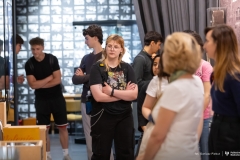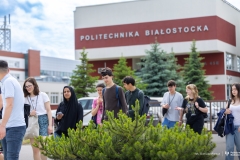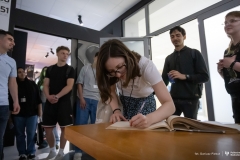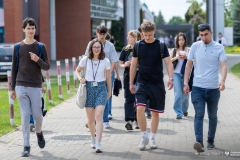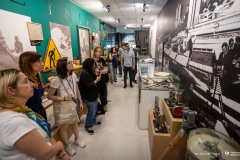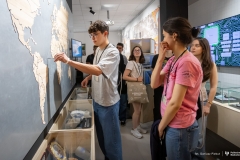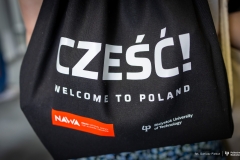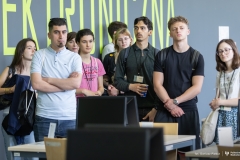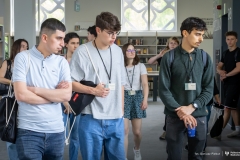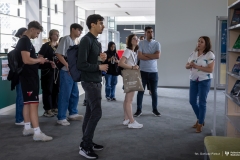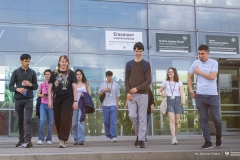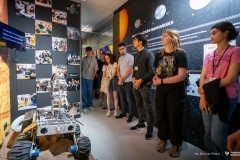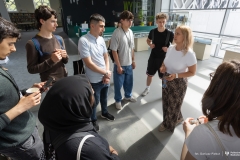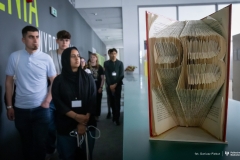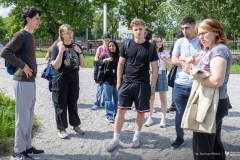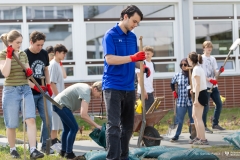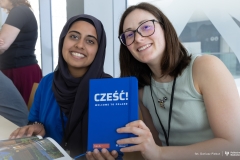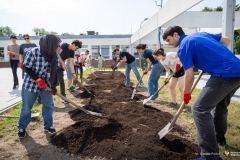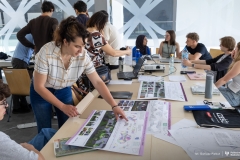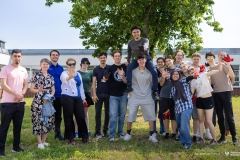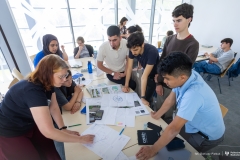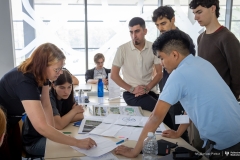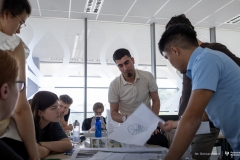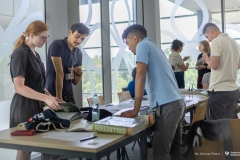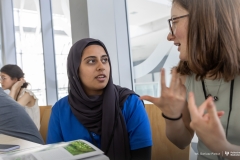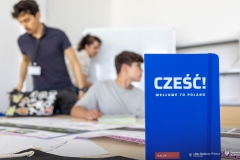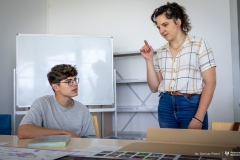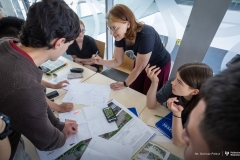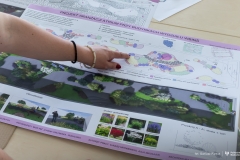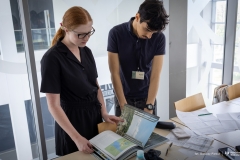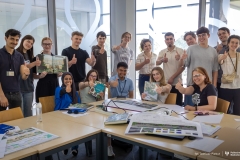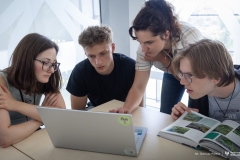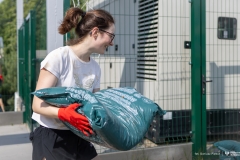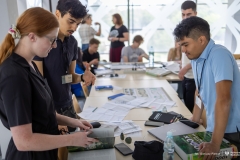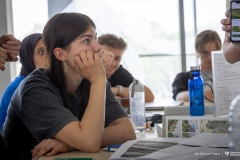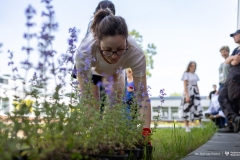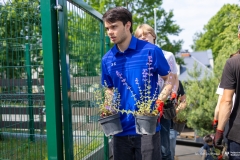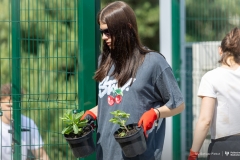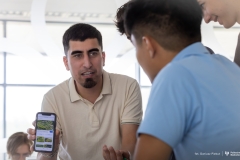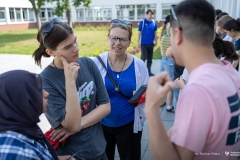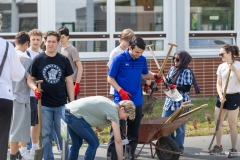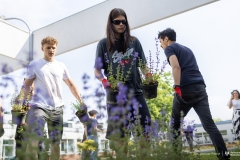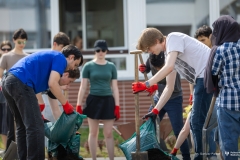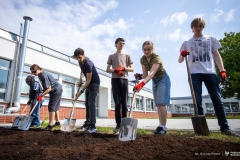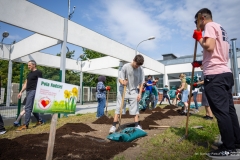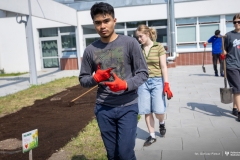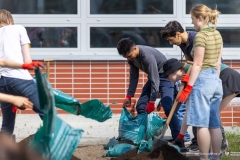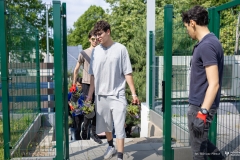My Green University. Volunteers from around the world help green the campus of Bialystok University of Technology
04-06-2025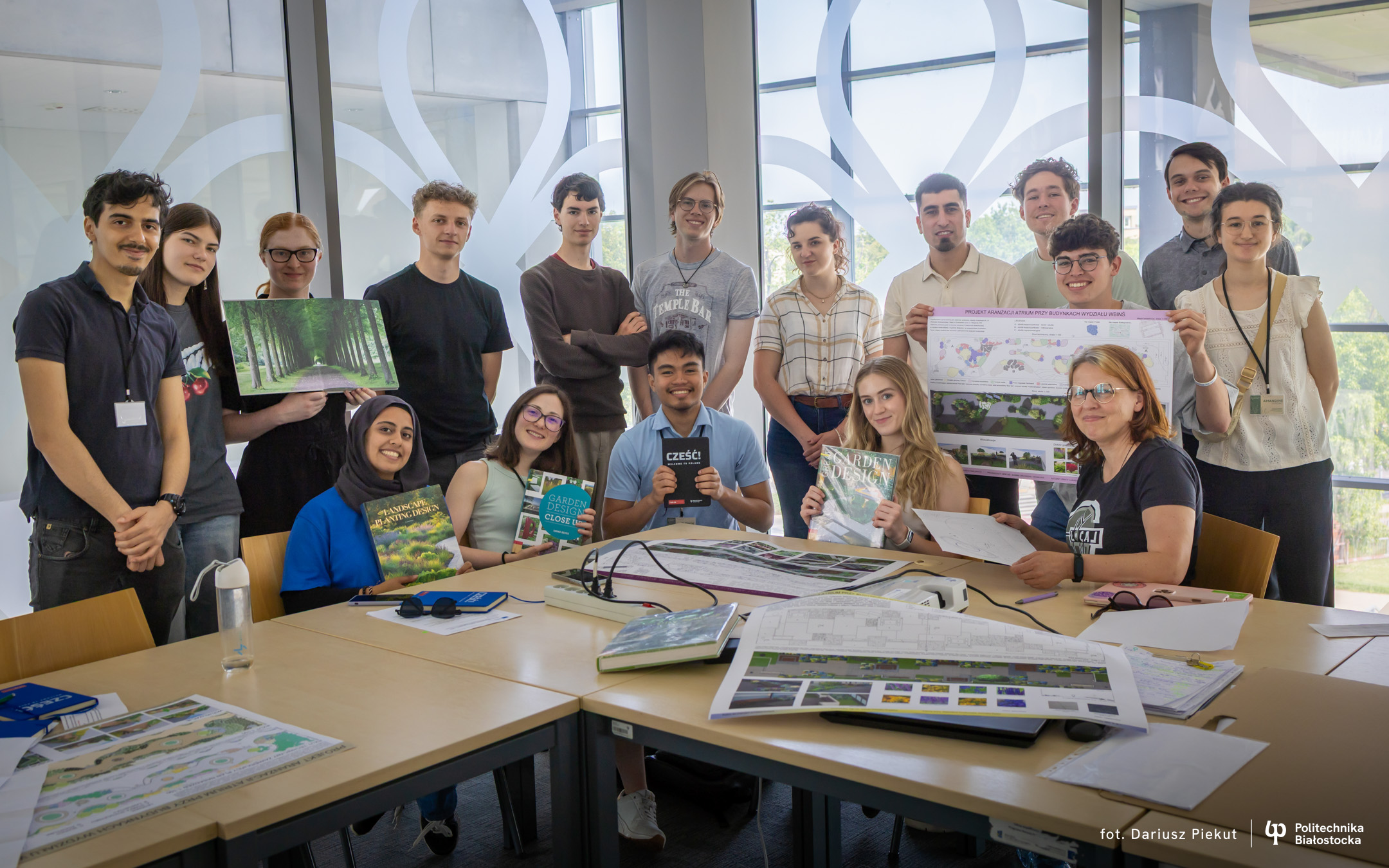
A total of 11 volunteers are taking part in the group volunteering project “My Green University” at Bialystok University of Technology. This group includes young people aged 18 to 28 who were drawn to the largest technical university in north-eastern Poland by a desire to learn about nature-based solutions – using nature to address environmental, social and economic challenges. The volunteering initiative also includes a group of 6 students from the Colorado School of Mines in the USA and two students from Bialystok University of Technology.
– I came here because I wanted to do something good for society and for the climate – says Sebastian from Germany. – The theme of this volunteering project, sustainable development, seems very interesting and relevant to me. I study physics in Germany and I see a lot of common ground here. Modern physics focuses on obtaining energy from renewable sources, which is closely linked to the concept of sustainable development.
The project “My Green University” will run from 2 to 15 June 2025. After the initial integration and introductory meetings with the academic community of Bialystok University of Technology, the volunteers started implementing tasks related to the university’s sustainable development strategy entitled “My Green University of Technology” and promoting the idea of volunteering in the spirit of the European Solidarity Corps.
– The idea of the project was born out of the need to engage young, creative people in activities to combat climate change and promote solutions that contribute to the sustainable development of university campuses – says Assoc. Prof. Dorota Anna Krawczyk, DSc, PhD, Eng, Vice-Rector for International Cooperation of Bialystok University of Technology and Ambassador of the European Climate Pact in Poland.
The volunteers will:
- take part in training on current threats resulting from climate change and learn about solutions that address them, such as blue-green infrastructure that improves urban quality of life and fosters active citizenship;
- co-create an ecological campaign promoting the idea of volunteering, for example through designing and distributing pro-environmental messages;
- create educational materials encouraging others to implement environmentally friendly habits in everyday life;
- together with the visiting students from the USA, participants of the 14th International Staff Week and the local community, get involved in greening the campus of Bialystok University of Technology.
The “My Green University” project is implemented thanks to the involvement of staff from the International Relations Offices of Bialystok University of Technology, who secured external funding for the project and prepared a rich programme for the volunteers. The initiative provides an opportunity to develop international academic cooperation, exchange experiences, and work together for a greener, more aware and more engaged university.
– This is the first volunteering project at Bialystok University of Technology that we are organising after receiving the European Solidarity Corps Quality Label in 2024. This certificate, awarded by the National Agency of the Erasmus+ Programme and the European Solidarity Corps, allows us to host volunteers from around the world – says Agata Dziekońska, Head of the Erasmus+ and NAWA International Projects Office. – When looking for the project’s theme, we chose sustainable development, which is one of the long-term goals of the European Union. We wanted to show volunteers how we implement this strategy at our university and ask for their help in greening the campus. I believe that many of them are happy to leave their green footprint here.
Volunteers from around the world will green the campus of Bialystok University of Technology. New plants will be added to the flowerbeds in the Science Garden located behind the Centre for Modern Education. There, a variety of perennial species that are both pollinator-friendly and visually attractive will be planted. The second area is the Sloboda Cyclarium, in the biocenotic garden on Świerkowa Street. Here, the “My Green University” volunteers, together with students of landscape architecture from the “Green Space” Student Science Association at the Faculty of Civil Engineering and Environmental Sciences of Bialystok University of Technology, will sow a flower meadow.
These activities are supported by experts from the Faculty of Civil Engineering and Environmental Sciences of Bialystok University of Technology involved in the “My Green University” project.
– We have a group of very active, very open students here. That’s why I believe all these goals will be achieved – says Dorota Gawryluk, PhD, Eng. Arch. from the Department of Sustainable Construction and Building Systems at the Faculty of Civil Engineering and Environmental Sciences. – These are young people full of energy who are eager to participate in processes based on nature-based solutions, i.e. using greenery to improve the urban environment. During “My Green University” we discuss how these solutions are implemented in different countries and European cities. We also talked about how the functions of urban areas are understood in different countries – whether cities are meant for people or for cars. The experience of the past two decades tells us that we should live closer together, surrounded by greenery and a healthy environment both at home and at work. This healthy living environment is what the volunteers are most keen to explore.
Students of various nationalities and fields of study are united by activities aligned with the sustainable development strategy adopted by Bialystok University of Technology under the name “My Green University of Technology”.
– I came here on the recommendation of my university – says Emma from the Colorado School of Mines in the United States. – I took it because I’m interested in sustainable development and this is a perfect opportunity to see how this concept is implemented in other countries. I study materials physics and I think this discipline is closely linked to sustainable development. I really like Bialystok. The first thing that stands out is the greenery of the city and the campus. I also appreciate how easy it is to get around Bialystok and the local public transport system. People are very friendly.
– Earlier, as part of Erasmus, I visited Kraków, and I’ve also been to Spain. I really enjoyed my stay in Poland and wanted to come back – says Tajewa from Pakistan, who is completing a bachelor’s degree in sociology at a university in Turkey. – The “My Green University of Technology” project really fits my interests. What sociology and sustainable development have in common is the social interest: caring for our surroundings, the planet, and other people.
The volunteers of the “My Green University” project will also take part in the 14th edition of the International Staff Week at Bialystok University of Technology. This is a regular event organised by the university for its international partners.
The spring edition of the International Staff Week will welcome around 50 participants representing countries such as: Albania, Algeria, Armenia, Bosnia and Herzegovina, Egypt, Fiji, Georgia, Guatemala, Spain, Jordan, Kazakhstan, Kyrgyzstan, Kosovo, Lithuania, Maldives, Mauritius, Mozambique, Nepal, South Africa, Republic of Moldova, Romania, Tunisia, Turkey, Ukraine and Zimbabwe. On 10 June 2025 (Tuesday), they can be met from 10:30 to 12:30 during the Cultural Stands event – a mini fair of academic exchange.
The “My Green University” project is implemented by the International Relations Offices of Bialystok University of Technology with the support of the Faculty of Civil Engineering and Environmental Sciences. In 2024, the university was awarded the European Solidarity Corps Quality Label – a certificate granted by the National Agency of the Erasmus+ Programme and the European Solidarity Corps, which allows the university to host volunteers from all over the world.
Izabela Karpińska Department of International Projects Erasmus+ and NAWA; edited by mr

The content of this publication represents the views of the author only and is his/her sole responsibility; it cannot be considered to reflect the views of the European Commission, the European Solidarity Corps National Agency or any other body of the European Union. The European Commission and the Agency are not responsible for any use that may be made of the information it contains.
